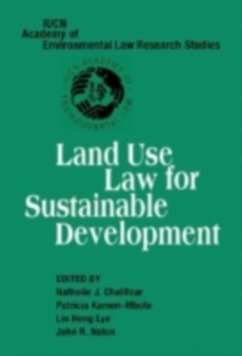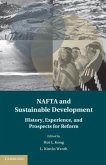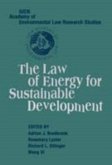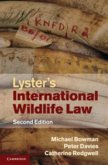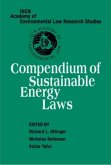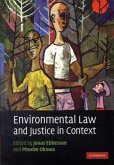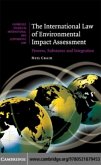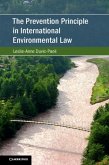Land Use Law for Sustainable Development (eBook, PDF)
Redaktion: Chalifour, Nathalie J.


Alle Infos zum eBook verschenken

Land Use Law for Sustainable Development (eBook, PDF)
Redaktion: Chalifour, Nathalie J.
- Format: PDF
- Merkliste
- Auf die Merkliste
- Bewerten Bewerten
- Teilen
- Produkt teilen
- Produkterinnerung
- Produkterinnerung

Hier können Sie sich einloggen

Bitte loggen Sie sich zunächst in Ihr Kundenkonto ein oder registrieren Sie sich bei bücher.de, um das eBook-Abo tolino select nutzen zu können.
This 2007 book surveys the global experience to date in implementing land-use policies that move us further along the sustainable development continuum. The international community has long recognized the need to ensure ongoing and future development is conducted sustainably. While high-level commitments towards sustainable development such as those included in the Rio and Johannesburg Declarations are politically important, they are irrelevant if they are not translated into reality on the ground. This book includes chapters that discuss the challenges of implementing sustainable land-use…mehr
- Geräte: PC
- mit Kopierschutz
- eBook Hilfe
- Größe: 6.25MB
- FamilySharing(5)
![NAFTA and Sustainable Development (eBook, PDF) NAFTA and Sustainable Development (eBook, PDF)]() NAFTA and Sustainable Development (eBook, PDF)29,95 €
NAFTA and Sustainable Development (eBook, PDF)29,95 €![Law of Energy for Sustainable Development (eBook, PDF) Law of Energy for Sustainable Development (eBook, PDF)]() Law of Energy for Sustainable Development (eBook, PDF)55,95 €
Law of Energy for Sustainable Development (eBook, PDF)55,95 €![Lyster's International Wildlife Law (eBook, PDF) Lyster's International Wildlife Law (eBook, PDF)]() Michael BowmanLyster's International Wildlife Law (eBook, PDF)34,95 €
Michael BowmanLyster's International Wildlife Law (eBook, PDF)34,95 €![Compendium of Sustainable Energy Laws (eBook, PDF) Compendium of Sustainable Energy Laws (eBook, PDF)]() Compendium of Sustainable Energy Laws (eBook, PDF)42,95 €
Compendium of Sustainable Energy Laws (eBook, PDF)42,95 €![Environmental Law and Justice in Context (eBook, PDF) Environmental Law and Justice in Context (eBook, PDF)]() Environmental Law and Justice in Context (eBook, PDF)109,95 €
Environmental Law and Justice in Context (eBook, PDF)109,95 €![International Law of Environmental Impact Assessment (eBook, PDF) International Law of Environmental Impact Assessment (eBook, PDF)]() Neil CraikInternational Law of Environmental Impact Assessment (eBook, PDF)40,95 €
Neil CraikInternational Law of Environmental Impact Assessment (eBook, PDF)40,95 €![Prevention Principle in International Environmental Law (eBook, PDF) Prevention Principle in International Environmental Law (eBook, PDF)]() Leslie-Anne Duvic-PaoliPrevention Principle in International Environmental Law (eBook, PDF)101,95 €
Leslie-Anne Duvic-PaoliPrevention Principle in International Environmental Law (eBook, PDF)101,95 €-
-
-
Dieser Download kann aus rechtlichen Gründen nur mit Rechnungsadresse in A, B, BG, CY, CZ, D, DK, EW, E, FIN, F, GR, HR, H, IRL, I, LT, L, LR, M, NL, PL, P, R, S, SLO, SK ausgeliefert werden.
- Produktdetails
- Verlag: Cambridge University Press
- Erscheinungstermin: 20. November 2006
- Englisch
- ISBN-13: 9780511254888
- Artikelnr.: 38208403
- Verlag: Cambridge University Press
- Erscheinungstermin: 20. November 2006
- Englisch
- ISBN-13: 9780511254888
- Artikelnr.: 38208403
- Herstellerkennzeichnung Die Herstellerinformationen sind derzeit nicht verfügbar.
Patricia Kameri-Mbote is an Associate Professor of Law and Chair of Department, Department of Private Law, Faculty of Law, University of Nairobi. She holds a Doctorate in Law and a Master of Laws Degree from Stanford University; a Master of Laws in Law and Development from Warwick University and a Postgraduate Diploma in Women's Law from the University of Zimbabwe. Her teaching and research interests fall in the areas of environmental law, law, science and technology, intellectual property rights, land law and feminist jurisprudence. She has served as Acting Dean of the Faculty of Law and research director at the African Centre for Technology Studies in Nairobi. She has also taught international environmental law at the University of Kansas. She is a member of the IUCN Commission on Environmental Law. She has published widely in the areas of international environmental law, biotechnology, women's rights and property rights.
Lin Heng Lye is an Associate Professor in the Faculty of Law at the National University of Singapore, and Deputy Director of the Faculty's Asia-Pacific Centre for Environmental Law. She chairs the University's inter-disciplinary Executive Committee for the Masters in Environmental Management programme and is Visiting Associate Professor at the Yale School of Forestry Environmental Studies. She holds masters' degrees in law from Harvard University and the University of London, and an LLB from the University of Singapore. She is an Advocate Solicitor of the Supreme Court of Singapore, and was Vice-Dean and Director of the Law Faculty's Graduate programmes. She is a member of the Land Titles (Strata) Board, and a former member of Singapore's public housing authority, the Housing Development Board (HDB) and the Tenants' Compensation Board. She has written and presented papers on environmental law in Singapore and Southeast Asia at conferences worldwide, She also teaches at the University of Sydney Law School. She is a consultant-trainer to the Regional Institute of Environmental Technology, was consultant to TRAFFIC Indochina, and has conducted capacity-building programmes for the World Bank, Asian Development Bank and the Ministry of Environment and Water Resources, Singapore.
John Nolon received his JD degree from the University of Michigan Law School, where he was a member of the Barrister's Academic Honor Society. His undergraduate degree is from the University of Nebraska, where he was President of the Senior Honor Society. He has served as a consultant to President Carter's Council on Development Choices for the 1980's, President Clinton's Council on Sustainable Development, New York Governor George Pataki's Transition Team, and the statewide Quality Communities Advisory Board directed by Lieutenant Governor Mary Donohue. Professor Nolon has been appointed Visiting Professor of Environmental Law at the Yale School of Forestry and Environmental Studies and named the Director of the Joint Center of Land Use Studies formed by Yale and Pace Law School. He served on the Editorial Advisory Board of the National Housing and Development Reporter and is a member of the Editorial Board of The Land Use and Environmental Law Review, published by Thompson-West. He has worked extensively on sustainable development in South America as a Fulbright scholar.
(including some comments from Professor Charles Okidi); 2. Distinguished
lectures; Part II. International Issues and Legal Responses to Sustainable
Land Management: 3. Is conservation a viable land usage? Issues surrounding
the sale of ivory by Southern African countries in 2004; 4. Land use and
climate change in Africa; 5. Climate change adaptation and mitigation:
exploring the role of land reforms in Africa; 6. The integration of
landscape into land use planning policy in relation to the new European
landscape convention; 7. EIA legislation and the importance of
transboundary application; Part III. National Approaches to Land Use
Planning for Sustainable Development: A. Africa: 8. Community rights to
genetic resources and their knowledge: African and Ethiopian perspectives;
9. Easements and wildlife conservation in Kenya; 10. Land tenure, land use
and sustainable environmental management in Kenya: towards innovative
property rights in wildlife management; 11. The development of
environmental law and its impact on sustainable use of wetlands in Uganda;
12. EIA and the four Ps: some observations from South Africa; 13. From
bureaucratic-controlled to stakeholders-driven urban planning and
management: experiences and challenges of environmental planning and
management in Tanzania; 14. Cooperative environmental governance in
developing countries: some perspectives on the integration of environmental
authorisations in South Africa; 15. Environmental law and sustainable land
use in Nigeria; 16. The role of administrative dispute resolution
institutions and processes in sustainable land use management: the case of
the national environment tribunal and the public complaints committee of
Kenya; 17. Managing the environmental impact of refugees in Kenya: the role
of national accountability and environmental law; 18. Environmental Impact
Assessment Law and land use: a comparative analysis of recent trends in the
Nigerian and US oil and gas industry; 19. Managing land use and
environmental conflicts in Cameroon; B. Asia: 20. Environmental law reform
to control land degradation in the People's Republic of China: a view of
the legal framework of the GEF-PRC partnership program; 21. Urbanization
and Environmental challenges in Pakistan; 22. Land stewardship and the law:
the ASEAN Heritage Parks and transboundary biodiversity conservation; 23.
Land-use planning, environmental management and the garden city as an urban
development approach in Singapore; 24. The law and preparation of
environmental management plans for sustainable development in Thailand; 25.
Nepal's legal initiatives on land use for sustainable development; C.
Australia: 26. Environmental law and irrigated land in Australia; 27.
Environmental impact assessment: addressing the major weaknesses; D. Latin
America: 28. Protection of natural spaces in Brazilian environmental law;
29. Land use planning in Mexico: as framed by social development and
environmental policies; 30. Argentina's constitution and general
environment law as the framework for comprehensive land use regulation; E.
North America: 31. Economic incentives to promote land stewardship; 32. The
2004 US Ocean Report and its implications for land use reform to improve
ocean water quality; 33. Historical overview of the American land system: a
diagnostic approach to evaluating governmental land use control; 34. Human
settlement priorities: missing legal elements in sustainable development.
(including some comments from Professor Charles Okidi); 2. Distinguished
lectures; Part II. International Issues and Legal Responses to Sustainable
Land Management: 3. Is conservation a viable land usage? Issues surrounding
the sale of ivory by Southern African countries in 2004; 4. Land use and
climate change in Africa; 5. Climate change adaptation and mitigation:
exploring the role of land reforms in Africa; 6. The integration of
landscape into land use planning policy in relation to the new European
landscape convention; 7. EIA legislation and the importance of
transboundary application; Part III. National Approaches to Land Use
Planning for Sustainable Development: A. Africa: 8. Community rights to
genetic resources and their knowledge: African and Ethiopian perspectives;
9. Easements and wildlife conservation in Kenya; 10. Land tenure, land use
and sustainable environmental management in Kenya: towards innovative
property rights in wildlife management; 11. The development of
environmental law and its impact on sustainable use of wetlands in Uganda;
12. EIA and the four Ps: some observations from South Africa; 13. From
bureaucratic-controlled to stakeholders-driven urban planning and
management: experiences and challenges of environmental planning and
management in Tanzania; 14. Cooperative environmental governance in
developing countries: some perspectives on the integration of environmental
authorisations in South Africa; 15. Environmental law and sustainable land
use in Nigeria; 16. The role of administrative dispute resolution
institutions and processes in sustainable land use management: the case of
the national environment tribunal and the public complaints committee of
Kenya; 17. Managing the environmental impact of refugees in Kenya: the role
of national accountability and environmental law; 18. Environmental Impact
Assessment Law and land use: a comparative analysis of recent trends in the
Nigerian and US oil and gas industry; 19. Managing land use and
environmental conflicts in Cameroon; B. Asia: 20. Environmental law reform
to control land degradation in the People's Republic of China: a view of
the legal framework of the GEF-PRC partnership program; 21. Urbanization
and Environmental challenges in Pakistan; 22. Land stewardship and the law:
the ASEAN Heritage Parks and transboundary biodiversity conservation; 23.
Land-use planning, environmental management and the garden city as an urban
development approach in Singapore; 24. The law and preparation of
environmental management plans for sustainable development in Thailand; 25.
Nepal's legal initiatives on land use for sustainable development; C.
Australia: 26. Environmental law and irrigated land in Australia; 27.
Environmental impact assessment: addressing the major weaknesses; D. Latin
America: 28. Protection of natural spaces in Brazilian environmental law;
29. Land use planning in Mexico: as framed by social development and
environmental policies; 30. Argentina's constitution and general
environment law as the framework for comprehensive land use regulation; E.
North America: 31. Economic incentives to promote land stewardship; 32. The
2004 US Ocean Report and its implications for land use reform to improve
ocean water quality; 33. Historical overview of the American land system: a
diagnostic approach to evaluating governmental land use control; 34. Human
settlement priorities: missing legal elements in sustainable development.
